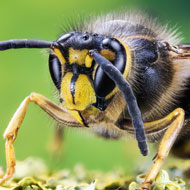
European hornet nests being mistakenly destroyed, trust says
Wildlife experts are warning people not to persecute native hornets, after recent UK sightings of the invasive Asian species, which is a threat to honey bees.
Devon Wildlife Trust said it has been contacted by people who believe they have an Asian hornet nest on their property, asking if they can destroy it. Others have gone ahead and destroyed nests without seeking advice.
However, further investigation has found all cases to be European hornets, not the invasive species.
The trust’s Steve Hussey said: “European hornets are a beautiful and vital part of our environment. They also help us by helping to keep in check many insect species that gardeners consider to be pests.”
“European hornets are also struggling and their persecution is one of the factors behind this recent decline.”
Asian hornets are devastating to honey bee populations, as they raid and destroy colonies. Confirmed reports of the invasive species in North Devon and Cornwall have prompted serious concern among UK bee keepers.
The trust is reminding people to follow official guidelines on suspected cases, which means taking a photograph of the insect without disturbing the nest. An online sighting report should be submitted to the GB Non-native Species Secretariat.



 The Veterinary Medicines Directorate (VMD) is inviting applications from veterinary students to attend a one-week extramural studies (EMS) placement in July 2026.
The Veterinary Medicines Directorate (VMD) is inviting applications from veterinary students to attend a one-week extramural studies (EMS) placement in July 2026.